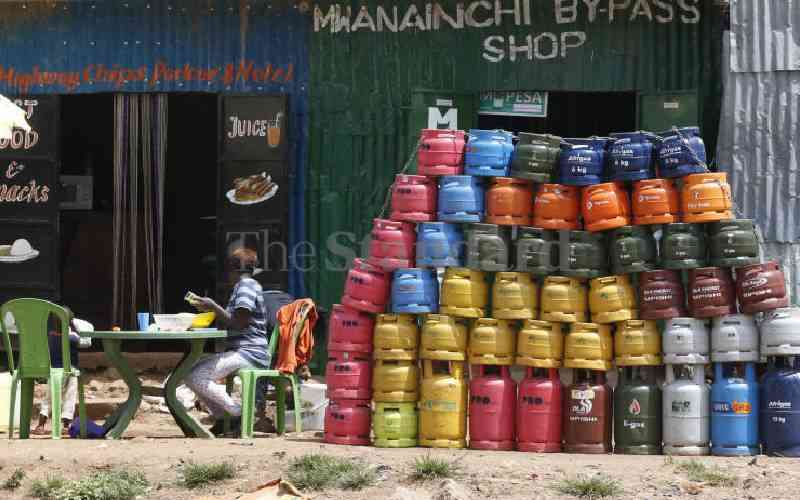By John Oyuke
Bright times could be lying ahead for Kenyans with purchasing power of household incomes projected to improve due to a slowdown in inflation.
Even though in the last couple of months there has been a general gloom in the economy with high interest rates and a headline inflation rate headed north— nearly hitting high of 20 per cent—experts are optimistic of better times ahead, though cautiously.
Analysts at Renaissance Capital, a leading investment bank focused on the emerging markets of Russia, Ukraine, Kazakhstan and sub-Saharan Africa believe buying power of household incomes will improve this year on the back of the projected slowdown in inflation.
"As household consumption expenditure makes up 75 per cent of the country’s gross domestic expenditure, we believe this is positive for real growth this year," they said.
According to Ms Yvonne Mhango, an economist at the Renaissance Capital Sub-Saharan Africa, it is the view of the investment bank that inflation has peaked and is set to slow in 2012.
"Lower food prices, due to increased output, a stable shilling and slower credit growth, due to high interest rates, will support softer inflation," she said.
The bank also expects an improvement in food production, due to better rainfall, to allow food prices to soften though it cautions that Kenya being a net food importer, even during periods of good rains, the expected re-instatement of the import duty on grain imports is likely to temper the fall in food prices.
"Moreover, the restoration of the import duty on fuel by the end of fiscal year 2011/2012 (July-June) may counter the effect of easing international oil prices, in our view," said Mhango.
However, despite the upside risk posed by the reinstatement of import duty on grains and fuel the bank expects inflation to fall back into the high single digits by year, partly due to a high base effect.
These views came as the Central Bank’s Monetary Policy Committee after its monthly meeting on Wednesday last week retained its signal rate at 18 per cent, arguing that the tight monetary policy needs to be maintained to further curb the high inflationary pressure that has started easing.
Inflation dropped from 18.93 per cent in December to 18.31 per cent last month, marking the second marginal drop after falling from a peak of 19.72 per cent in November.
The drop in the cost of goods and services has been linked to lower fuel prices, increased food production, a stronger shilling and reduced uptake of loans due to high interest rates.
FLOUR PRICES
According to Kenya National Bureau of Statistics, Consumer Price Indices and rates of inflation for January 2012 food and non-alcoholic drinks’ index went up by 0.58 per cent between December 2011 and January 2012.
The increase was a net effect of both rises and falls in the prices of a number of food products. For instance, the prices of tomatoes, sukuma wiki, potatoes, cabbages and onions went up by 14.97, 13.31, 12.43, 25.26 and 14.19 per cent, respectively, between the two
months.
On the other hand, the prices of sugar, maize flour, rice, green maize and maize grain went down by 13.19, 3.47, 2.35, 4.00 and 1.36 per cent, respectively, over the same period.
Housing, water, electricity, gas and Other fuels’ index went up by 0.49 per cent between December 2011 and January 2012.
Whereas the cost of several house rents recorded increases, notable falls in the prices of electricity and kerosene were recorded over the same period.
Due to reduced fuel and forex adjustment charges, the cost of consuming 50 units of electricity for example went down from Sh736 in December 2011 to Sh582 last month.
The transport index went down by 1.47 per cent between December 2011 and January 2012 as a result of falls in matatu, bus and taxi fares that was attributed to reductions of 4.59 and 1.70 per cent respectively in the prices of petrol and diesel.
Education and health indices went up by 3.14 and 3.13 per cent respectively due to higher costs of school fees, textbooks, medicines and treatment charges observed in January 2012 compared to December 2011.
MPC says the tight monetary policy, which has seen interest on bank loans surge beyond the 25 per cent mark, should be supported to cool off inflation by reducing demand for imported goods and services.
MPC had raised the policy rate by nearly three-fold from 6.5 per cent in less than three months to 18 per cent December in response to a rapidly depreciating shilling and soaring commodity prices.
 The Standard Group Plc is a multi-media organization with investments in media
platforms spanning newspaper print operations, television, radio broadcasting,
digital and online services. The Standard Group is recognized as a leading
multi-media house in Kenya with a key influence in matters of national and
international interest.
The Standard Group Plc is a multi-media organization with investments in media
platforms spanning newspaper print operations, television, radio broadcasting,
digital and online services. The Standard Group is recognized as a leading
multi-media house in Kenya with a key influence in matters of national and
international interest.
 The Standard Group Plc is a multi-media organization with investments in media
platforms spanning newspaper print operations, television, radio broadcasting,
digital and online services. The Standard Group is recognized as a leading
multi-media house in Kenya with a key influence in matters of national and
international interest.
The Standard Group Plc is a multi-media organization with investments in media
platforms spanning newspaper print operations, television, radio broadcasting,
digital and online services. The Standard Group is recognized as a leading
multi-media house in Kenya with a key influence in matters of national and
international interest.









